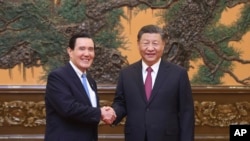ປະທານປະເທດຈີນ ທ່ານ ສີ ຈິນຜິງ ໄດ້ພົບປະກັບອະດີດປະທານາທິບໍດີໄຕ້ຫວັນ ທ່ານ ໝ່າ ຢິງ-ໂຈ (Ma Ying-jeou) ທີ່ນະຄອນຫຼວງປັກກິ່ງ ໃນວັນພຸດວານນີ້ ເພື່ອຊຸກຍູ້ການລວມເປັນອັນນຶ່ງດຽວກັນ ລະຫວ່າງສອງຝ່າຍທີ່ໄດ້ແຍກອອກຈາກກັນໃນລະຫວ່າງຊ່ວງສົງຄາມກາງເມືອງໃນປີ 1949.
ທ່ານ ໝ່າ ໄດ້ອອກຈາກຕໍາແໜ່ງ ເກືອບ 2 ທົດສະວັດແລ້ວ ແລະສ່ວນໃຫຍ່ ຖືກແຍກອອກຈາກການໂຄສະນາຫາສຽງທີ່ຫຼົ້ມແຫຼວຂອງພັກຊາດນິຍົມຝ່າຍ ຄ້ານໃນການຊິງຕໍາແໜ່ງປະທານາທິບໍດີຄືນໃນເດືອນມັງກອນທີ່ຜ່ານມາ ເຊິ່ງເປັນການຍອມໃຫ້ຜູ້ມີສິດເລືອກຕັ້ງທີ່ຄັດຄ້ານຢ່າງແຮງຕໍ່ການຮ່ວມເຂົ້າກັນ ທາງດ້ານການເມືອງກັບຈີນ ແລະນັກການເມືອງທີ່ເຖິງເບິ່ງວ່າມີຄວາມມຸ່ງຫວັງທີ່ ຈະປະນີປະນອມຕໍ່ຄວາມໝັ້ນຄົງຂອງໄຕ້ຫວັນ.
ທ່ານໄດ້ຕິດຕາມບັນດານັກການເມືອງທີ່ຍາວນານຈາກກຸ່ມຊາດນິຍົມ ຫຼື ທີ່ຮູ້ຈັກ ກັນໃນຊື່ KMT, ເຊິ່ງໄດ້ຮັບເຊີນໄປປະເທດຈີນໂດຍລັດຖະບານພັກດຽວທີ່ເປັນ ຜະເດັດການ ແລະໄດ້ຮັບການປະຕິບັດແບບ VIP ໃນການໄປຢ້ຽມຢາມທົ່ວປະ ເທດ.
ຈີນອ້າງວ່າໄຕ້ຫວັນເປັນດິນແດນຂອງຕົນ, ແລະ ຈະຖືກຮວມເຂົ້າກັນດ້ວຍກຳ ລັງຖ້າຈຳເປັນ. ປັກກິ່ງ ສົ່ງກຳປັ່ນກອງທັບເຮືອ ແລະເຮືອບິນລົບໄປອ້ອມແອ້ມເກາະດັ່ງກ່າວເປັນປະຈຳວັນ ໂດຍຫວັງວ່າຈະທຳລາຍແນວປ້ອງກັນຂອງໄຕ້ຫວັນ ແລະຂົ່ມຂູ່ປະຊາຊົນ.
“ປະຊາຊົນຢູ່ສອງຝັ່ງຊ່ອງແຄບໄຕ້ຫວັນ ລ້ວນແຕ່ແມ່ນຊາວຈີນທັງໝົດ. ບໍ່ມີຂໍ້ຂັດແຍ່ງໃດທີ່ບໍ່ສາມາດແກ້ໄຂໄດ້, ບໍ່ມີບັນຫາໃດທີ່ບໍ່ສາມາດປຶກສາຫາລືໄດ້, ແລະບໍ່ມີອຳນາດໃດສາມາດແຍກພວກເຮົາອອກຈາກກັນໄດ້,” ທ່ານ ສີ ບອກກັບ ທ່ານ ໝ່າ.
ທ່ານກ່າວຕື່ມວ່າ "ຄວາມແຕກຕ່າງໃນລະບົບຈະບໍ່ສາມາດປ່ຽນແປງຄວາມຈິງທີ່ວ່າທັງສອງຝັ່ງ ຂອງຊ່ອງແຄບໄຕ້ຫວັນເປັນຂອງປະເທດ ແລະຊາດດຽວກັນ."
ອ່ານຂ່າວນີ້ເປັນພາສາອັງກິດ
Chinese President Xi Jinping met with former Taiwanese President Ma Ying-jeou in Beijing Wednesday in a bid to promote unification between the sides that separated amid civil war in 1949.
Ma left office almost two decades ago and was largely excluded from the opposition Nationalist Party’s failed campaign to retake the presidency in January, a concession to the electorate's strong opposition to political unification with China and politicians seen as willing to compromise Taiwan's security.
He follows a long line of politicians from the Nationalists, also known as the KMT, who have been invited to China by its authoritarian one-party government and given VIP treatment on visits around the country.
China claims Taiwan as its own territory, to be annexed by force if necessary. Beijing sends navy ships and warplanes around the island on a daily basis in hopes of wearing down Taiwan's defensives and intimidating the population.
“The people on both sides of the Taiwan Strait are all Chinese. There is no dispute that cannot be resolved, there is no problem that cannot be discussed, and no force can separate us," Xi told Ma.
"Differences in systems cannot change the fact that both sides of the Taiwan Straits belong to the same country and nation,” he added.
Ma responded that a new war between the sides would be “an unbearable burden for the Chinese nation.”
"The Chinese people on both sides of the Taiwan Strait will definitely have enough wisdom to handle cross-Strait disputes peacefully and avoid conflicts,” Ma said.
Independence leaning president-elect Lai Ching-te of the Democratic Progressive Party won the January election handily and his vice president-elect Bi-khim Hsiao has been visiting nations friendly to Taiwan in Europe and elsewhere ahead of taking office.
Ma's 11-day trip, ostensibly at the head of a student delegation, underlines continued interactions in education, business and culture despite Beijing’s threat to use military force against the self-governing island democracy to achieve unification.
Toward the end of his second term in 2015, Ma held a historic meeting with Xi in Singapore, which has close contacts with both sides. The meeting produced few tangible outcomes, and Ma’s Nationalist Party lost the next presidential election to Tsai Ing-wen of the DPP.
Lai Ching-te, currently vice president, is despised by Beijing for his opposition to unification. The Nationalists recovered a narrow majority in the legislature but their influence on foreign policy and other national issues remains limited.
Taiwan has been boosting military relations with allies such as the U.S. and Japan while maintaining close economic ties with the Chinese mainland.





ຟໍຣັມສະແດງຄວາມຄິດເຫັນ